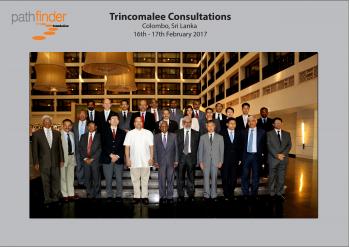The ‘Trincomalee Consultation 2017’, a Track 1.5 dialogue, was organized by the Pathfinder Foundation (Sri Lanka) in collaboration with Carnegie India to discuss the development of Trincomalee port as regional hub for the Bay of Bengal. The Consultation was held in Colombo from 16 – 17 Feb 17 with support from the Japanese and Norwegian Embassies in Colombo. A team from Vivekananda International Foundation (VIF) comprising Commodore Gopal Suri and Ms Anushree Ghisad attended the dialogue. The dialogue had participation from the Sri Lanka Ministries of Defence, Shipping, Tourism and the Governor of the Eastern province as also senior Sri Lanka Navy and Air Force officers. The Indian Government was represented by the Joint Secretary (Policy Planning) from the MEA and the High Commission in Colombo. Other government dignitaries included the High Commissioner of Bangladesh, the Japanese Ambassador to Sri Lanka and a Deputy Director General from the Japanese Ministry of Foreign Affairs as also the Secretary General BIMSTEC. The participants comprised eminent persons from the academia, business community and the strategic affairs fraternity of India, Bangladesh and Sri Lanka.
 The dialogue was spread over two days and three sessions with a session each dedicated to the Geostrategic Significance of the Bay of Bengal, Transportation and Economic Connectivity in the Bay of Bengal and the Potential for Development of Trincomalee as a Hub for the Bay of Bengal. Papers were presented in each of the sessions with country perspectives being provided by various participants subsequently. The discussions were candid and extensive.
The dialogue was spread over two days and three sessions with a session each dedicated to the Geostrategic Significance of the Bay of Bengal, Transportation and Economic Connectivity in the Bay of Bengal and the Potential for Development of Trincomalee as a Hub for the Bay of Bengal. Papers were presented in each of the sessions with country perspectives being provided by various participants subsequently. The discussions were candid and extensive.
The strategic importance of the Bay of Bengal was highlighted considering the development underway in the countries in its littoral. The underdeveloped state of infrastructure in the region, which impedes connectivity and thence the effective exploitation of the resources of the hinterland, was brought out. The importance of taking collective responsibility for growth in the regionand limiting the dangers posed by political rivalry in the Bay of Bengal was underlined. The necessity for advancing economic cooperation and facilitating commerce to generate leverage on the global economic map for overall development of the region was repeatedly highlighted.
 The Bay of Bengal suffers from poor connectivity which needs to be enhanced urgently if it has to achieve its full potential in the near future. There are huge impediments in establishing connectivity between countries of the region due to legacy bureaucratic hurdles as also inter-state differences. The importance of dovetailing initiatives like India’s Sagarmala with the needs of the rest of the region was brought to the fore. Many of the participants opined that India should take the lead in such projects for enhancing cooperation in the region and could also take the responsibility for such developments. It was also opined that maritime infrastructure development should be undertaken with a regional perspective and not just a country perspective.
The Bay of Bengal suffers from poor connectivity which needs to be enhanced urgently if it has to achieve its full potential in the near future. There are huge impediments in establishing connectivity between countries of the region due to legacy bureaucratic hurdles as also inter-state differences. The importance of dovetailing initiatives like India’s Sagarmala with the needs of the rest of the region was brought to the fore. Many of the participants opined that India should take the lead in such projects for enhancing cooperation in the region and could also take the responsibility for such developments. It was also opined that maritime infrastructure development should be undertaken with a regional perspective and not just a country perspective.
Trincomalee harbor is naturally blessed with great depths and expansive sea room which can be leveraged to provide the Bay of Bengal region with a multi-functional hub. However, the area suffers from a number of infrastructural gaps like connectivity, lack of development, etc on account of the years of neglect due to the past insurgency. Some of the prospects for development include the establishment of a shipping hub, ship repair centres, MDA hub, etc. However, all of these will require prior establishment of basic infrastructure. India is being looked upon as the leader for providing guidance in development of such infrastructure. The Japanese expressed the possibility of cooperation in this development though detailed studies will be required for establishing the feasibility of such ventures.
The Trincomalee Consultation was intended to be the first of such dialogues for enhancing regional cooperation which will benefit overall development of the Bay of Bengal littoral.



